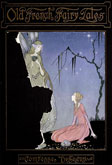The Poor Sick Mother
French folktale
There was a poor woman, a widow, who lived alone with her little son Henry. She loved him tenderly and she had good reason to do so, for no one had ever seen a more charming child. Although he was but seven years old, he kept the house while his good mother labored diligently and then left home to sell her work and buy food for herself and her little Henry. He swept, he washed the floor, he cooked, he dug and cultivated the garden and when all this was done he seated himself to mend his clothes or his mother's shoes and to make stools and tables—in short, to do everything his strength would enable him to do.
The house in which they lived belonged to them, but it was very lonesome. In front of their dwelling there was a lofty mountain so high that no one had ever ascended to its summit, and besides it was surrounded by a rushing torrent, by high walls and insurmountable precipices.
The mother and her little boy were happy but alas! one day the poor mother fell sick. They knew no doctor and besides they had no money to pay for one. Poor Henry did not know how to cure her. He brought her fresh cool water for he had nothing else to give her, he stayed by her night and day and ate his little morsel of dry bread at the foot of her bed. When she slept he looked at her sadly and wept. The sickness increased from day to day and at last the poor woman was almost in a dying condition. She could neither speak nor swallow and she no longer knew her little Henry, who was sobbing on his knees near her bed. In his despair, he cried out:
"Fairy Bienfaisante, come to my help! Save my mother!"
Henry had scarcely pronounced these words, when a window opened and a lady richly dressed entered and in a soft voice, said to him:
"What do you wish of me, my little friend? You called me—here I am!"
"Madam," cried Henry, throwing himself on his knees and clasping his hands, "if you are the fairy Bienfaisante, save my poor mother who is about to die and leave me alone in the world."
The good fairy looked at Henry most compassionately and then, without saying a word, she approached the poor woman, bent over her, examined her attentively, breathed upon her and said:
"It is not in my power, my poor child, to cure your mother; her life depends upon you alone, if you have the courage to undertake the journey I will point out to you."
"Speak, madam! I entreat you to speak! there is nothing I will not undertake to save the life of my dear mother."
The fairy replied,
"You must go and seek the plant of life, which grows on top of the mountain that you see from this window. When you have obtained this plant, press its juice into the mouth of your mother and she will be immediately restored to health."
"I will start out immediately, madam. But who will take care of my poor mother during my absence? And, moreover," said he, sobbing bitterly, "she will be dead before my return."
"Do not worry, my dear child. If you go to seek the plant of life, your mother will need nothing before your return; she will remain precisely in the condition in which you leave her. But you must dare many dangers and endure many things before you pluck the plant of life. Great courage and great perseverance are necessary on your part."
"I fear nothing, madam, my courage and perseverance shall not fail. Tell me only how I shall know this plant amongst all the others which cover the top of the mountain."
"When you reach the summit, call the doctor who has charge of this plant, inform him that I have sent you and he will give you a branch of the plant of life."
Henry kissed the good fairy's hands and thanked her heartily, took a sorrowful leave of his mother, covering her with kisses, put some bread in his pocket and set out, after saluting the fairy respectfully.
The fairy smiled encouragingly at this poor child who so bravely resolved to ascend a mountain so dangerous that none of those who had attempted it had ever reached the summit.
Old French fairy tales

Notes: The book contains 5 long French folktales. Each story has several chapters.
Author: Comtesse de Ségur
Published: 1920
Publisher: The Penn Publishing Company, Philadelphia